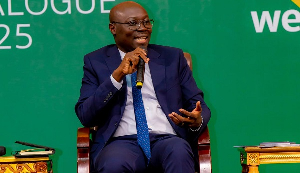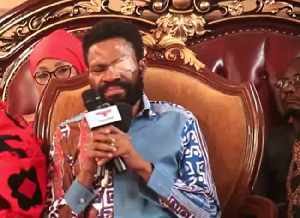Part 5
It had been five years since I left the land of my birth and pitched camp with strangers in a foreign land. I had left a God-fearing gentleman with a recognizable swagger, and quite happy with my budding moustache, not the beard. I had left with the twin objective of acquiring two or three more academic laurels and a bit of cash to buy my dream car, and a bit more to live the veritable burger life. I had come back in ?Fragments,? as Ayi Kwei Armah would have me, sobered by awesome discoveries, flattered by half-realised dreams and confused by memorably revealing experiences. I had broken bread with an Iraqi and shared a flat with an Afghan. I had taught Russians, Columbians and Lithuanians, and attended an Indian marriage ceremony. I had worked with Malawians and gotten very close to Shemezo, a Zimbabwean, whose name meant miracle. And she was a real miracle, too. My attitude towards many things, especially religion, had become latitudinal, and multiculturalism had become a constant ingredient in my stream of thoughts. Those experiences had been a filter that had left an imprint on me.So, I had returned a changed man with a panoramic world view, cured of tribalism and the associated complexes. And, coming home had not entirely been my decision; it had been occasioned by desperate yearnings deep down within that pull you to where your umbilical cord was cut. I would later learn that folks abroad, even those who have acquired citizenship of their adopted countries, and those who have sworn by their mothers? graves never to return to their home country, cared more about developments in Ghana than the salvation of their very souls. In less than a week into my stay, I had received lots of emails from folks abroad, itching to know how far Ghana had gone in achieving the millennium goals. They were concerned with how Ghanaians were coping with the new Ghana Cedi and the direction of the economy than the litigation on their plots of land. That self-centeredness I had been writing about had given way to a new patriotic feeling, where Ghana comes first and every other thing second to none.
If that sounded incongruous, then that is exactly what it is. Ghana does not come first in many things Ghanaians do in Ghana. I had heard a presidential aspirant declare in a speech: ?I believe in Ghana, I believe in Ghana?, and he had rendered it at a decibel, with so much conviction and power. That gave me hope to believe that the processes and procedures of yesteryears were about giving way to a new beginning. My Iraqi friend had told me that he wished he was living in Ghana, and his reasons had been that he had been told he could drive a car without a driving license and build his house anywhere. He had failed his driving test in London for the umpteenth time, and he was considering quitting it altogether. Is Ghana a haven for lawlessness and carelessness?
I had always known that due process was sometimes bypassed and queues were jumped, and when it was bad enough, very short queues were made longer for those who did not want to do what it took to jump them. I had always known that sometimes established procedures were caved in for those who could flex a financial muscle. For those who insisted on order and sanity, the procedures were made overly procedural, so that they never got to the other end of the process. But I always knew that the situation had not gotten to a state where we needed a deux ex machina-a God-sent timely intervention- to prevent an eventual collapse of an otherwise well protected system.
I had been following the politics of the major political parties in the country and had commented on a few things in my writings. I had bemoaned the insults and regretted how dissent was sometimes treated as a negotiable commodity. I had visited a very old friend who had been appointed the constituency chairman of his political party. He had heard of my visit the previous day to his house and had instructed his household to inform me whenever I came again that he wasn?t at home. He had been reading me and had thought that he couldn?t deduce my political persuasion. I had not been writing in support of his party, so he had considered me a spy for the opposing camp. Even if I was a spy, how could I influence anything from where I live? I had decidedly stayed out of serious political discourses- the kind of discourse that requires you to take a stand, because I don?t have a stand. The only party I stand for is corporate Ghana.
I thought the immature politics of yesterday, where a person was deemed an enemy, because he did not belong to the other camp, had gone with its associated intimidation, vigilantism and open hatred. Ours is still in its embryonic stages, but I was confident that our democracy had gone past this stage, at least for a constituency chairman. In any case, I had not been writing anything untoward; I had only been taking advantage of the free market place that democracy presents, and been throwing my ideas into the market, in much the same way as I would my vote. It made me wonder whether the bentoa days, where voters in the villages were allegedly given bentoa to vote for a political party, were really over. If a party executive, who has several degrees under his belt, takes a writer for an enemy, then we shouldn?t be surprised that the only strategy we have devised to help check corruption in Africa is the award of $2.5Million for the African politician who did not steal his people?s money. I think Dr Mo Ibrahim, the originator of the concept, could have done better setting up a peace commission, with any good African statesman as the envoy, than giving cash to presidents for what they were elected to do anyway. It is analogous to a situation where a mother places before her child a bowl of rice, and then promises her that if she is able to finish the rice, she would get ice cream for desert.
I had been told that I could procure an international driving license without appearing at the DVLA, if I was prepared to part with some cash. In fact, I had been assured by others that I could have the license sent to me in London by a DVLA officer if I paid as little as ?30. And it didn?t matter whether I had a previous driving license or had ever driven in my home country. With no name in mind and no personal telephone number to call, I made my way to the DVLA offices in one of the regions. I loitered at the offices for a while without anybody winking at me. Then I approached a staff member who looked like a ?connection man.? I told him I didn?t live in the country and that I wanted a license to take abroad. ?Oh international, that can be done easily, depending on how soon you want it?, he said with some authority. I asked him how soon it could be done, and he said it was up to me. Then I asked how much would be enough for the project. He smiled heartily and mentioned a figure in pounds sterling. I don?t know how he managed to know that I had come from the UK. I smiled back and flew to London the following day. He must have budgeted with the amount we agreed on. His girlfriend will be very sad. I had hoped to find the streets cleaned of beggars, drains covered and mosquitoes orphaned, so that they would die of hunger. I had not been used to mosquitoes for a long time, and I had forgotten what open drains looked like. The beggars I had seen in England drink beer and eat chicken. Some even have regular girlfriends who love them unreservedly. I had been accosted by a beggar at a popular shopping centre, who wanted ?1 to buy beer. It was my first week in the UK, and I was shocked to know that beggars in some countries are unchristian enough to drink beer. Where I come from, they sleep in gutters and the state pretends they don?t exist. There are often no good policies for such people, and it is the profession for the disabled. The beggar?s request had angered me, because I had known beer as the drink for the rich pot-bellied gentlemen, who could afford to buy the accompanying aponkye kebab. And chicken is eaten once a year during Christmas. I gave the obroni beggar an apple and he said ?no mate, thank you.?
Why should a beggar call me his mate? I am not in the same begging profession as him. I would learn a few weeks later that beggars over here are not spat on and shunned as we do in Ghana. So, they are confident enough to feel that other professionals in society are their mates. The disabled are not left to beg; they are very much a part of the system. Employers provide for them and architectural structures are done with the disabled in mind. In fact, those who beg in that welfare country are the lazy scroungers who do not want to do a day?s work in their lives, even though work abound. The situation in Ghana was very much the converse, where beggars are mates only with the open gutters their noses are buried in. They are littered all over: markets, car stations, alleyways, principal streets, and around churches. I wonder if they know the taste of chicken. I was horrified to think that Tingi-Tingi, that massive lecture theatre that had become the toast of Legon when I was a student there some years ago, had no provision whatsoever for disabled students. I pictured how some students used eternity to climb those never-ending stairs that looked like an Elizabethan amphitheatre built on credit.
I was equally horrified to think that over here that building would have been shut down under health and safety rules. But, who cares about health and safety in a situation where the careless hooting of horns by taxi drivers and the thunderous yells of Kantamanto sellers combine to produce a hell-breaking cacophony of devilish advertising that could break the tympanic membrane of the old man in the heavens. You are safe and healthy enough if you are able to navigate your way through all that mess and wait in traffic for as long as it would take a carpenter to do a heart surgery, to make your way to a home where electric energy is a luxury.
I had come back thinking of when Ghana would get a free newspaper or regional newspapers. That has been my obsession for so long, but I have always found it difficult to express it. Well, I hear the Daily Express is trying to do something like that. Who cares about a free newspaper when every newspaper is called Graphic? Who cares about a free newspaper when there are not enough libraries for people to sit and read? Who cares about a free newspaper when there are still some schools held under trees in our villages? Who cares about a free newspaper when the editorials of the existing papers are read only by the very people who wrote them, because people don?t bother to read past the headlines? Think of what Koforidua Gazette or Sunyani Chronicle could do.



![New IGP, COP Christian Tetteh Yohonu [L] and immediate-past IGP, Dr. Akuffo Dampare New IGP, COP Christian Tetteh Yohonu [L] and immediate-past IGP, Dr. Akuffo Dampare](https://cdn.ghanaweb.com/imagelib/pics/140/14041582.295.jpg)











